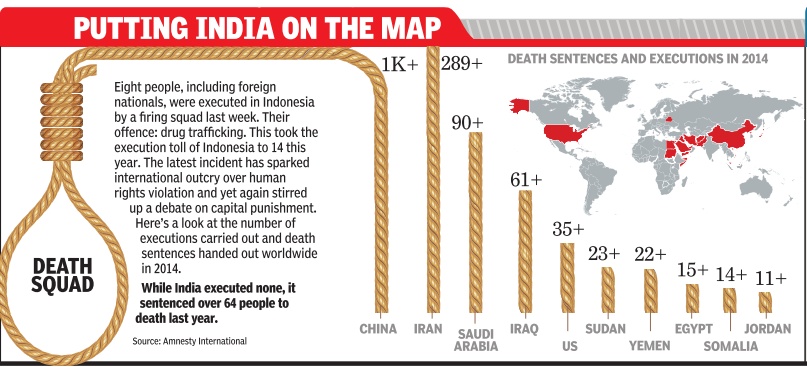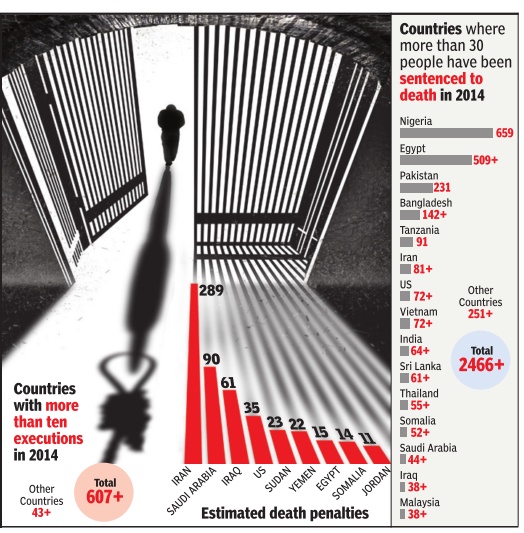Capital punishment: South Asia


This is a collection of articles archived for the excellence of their content. |
Contents |
Death sentence: 2014
Apr 10 2015
A recently released report of Amnesty International on death sentences and executions in 2014 says that capital punishment is being used at an alarming rate because of perceived threats to states' safety because of terrorist activities and internal instability. For instance, Pakistan lifted a six-year moratorium on the death penalty after the Peshawar school attack. The organization estimates that at least 2,466 death sentences were awarded in 2014, 28% more than in 2013. In India, at least 64 were awarded the death sentence in 2014, but no executions were carried out Source: Amnesty International, reliable data not availabe for China, North Korea and South Sudan
Convicts can not be hanged secretly and hurriedly: SC
India Today May 28 2015
AmitAnand Choudhary
`They Must Be Allowed To Exhaust All Legal Remedies, Meet Family'
Condemned prisoners also have a right to dignity, the Supreme Court has said holding that execution of death sentence cannot be carried out in an arbitrary , hurried and secret manner without allowing convicts to exhaust all legal remedies and meet family members. “Right to life under Article 21 of the Constitution does not end with the confirmation of the death sentence. Even in cases of death row convicts, their right to dignity must be protected,“ said a bench of Justices A K Sikri and U U Lalit while quashing the execution warrants of a young woman and her lover, convicted for killing seven members of her fam ily, including a 10-month-old baby , in Uttar Pradesh in 2008.
The observations assume significance in the context of the hue and cry raised by human rights activists after Parliament attack convict Afzal Guru was hanged in the capital's Tihar jail in 2013 even before his family members could get the intimation.
In the case of the couple -Shabnam and Saleem -the bench said, “We find that death warrant was signed by the sessions judge in haste without waiting for convict to exhaust all legal remedies.“ It pointed out that the condemned prisoners can file a review petition before the SC and can also seek mercy from the the President or governor.
Referring to the Allahabad HC order on the procedure to be followed for execution of death sentence, the bench said that principles of natural justice must be followed and sufficient notice given to the convict before the issuance of death warrant to enable himher to pursue legal recourse and have a final meeting with family members. In cases where a convict is not in a position to get legal assistance, legal aid must be provided, it said.
The bench expressed surprise on the “unwarranted“ haste with which the Amroha court issued execution warrants, just six days after the SC awarded death to the couple on May 15 for wiping out the woman's entire family to remove opposition to their affair and grab family property.
The apex court said the sessions court issued the warrant without waiting for the mandatory 30 days to allow death row convicts to avail judicial remedy of filing petitions for a review.
Death penalty and government
Dhananjay Mahapatra | TNN
FROM THE ARCHIVES OF ‘‘THE TIMES OF INDIA’’: 2008
SC stand against terror often negated by govt
Every single death sentence awarded by Supreme Court makes news. The extreme penalty is handed down only in rarest of rare cases relating to heinous crimes which reflect the nadir of human depravity and senselessness.
Death penalty is awarded after careful scrutiny of evidence by all three courts — subordinate, high court and Supreme Court. But, that is not the end of the road for a condemned convict. He could still send mercy pleas to the President or the governor, as the case may be, and bide his time during its pendency. In the courts presided over by terrorists, however, legal procedures are redundant. Death sentences get awarded to unknown number of innocents the moment they assemble a bomb and plant it in crowded places. The dance of death unfolds in public at the press of a remote. For, the extreme law followed by terrorists has no chapter on mercy jurisprudence.
Every blast leaves children orphaned, women widowed and parents to grieve a lifetime over their lost children. Communal harmony gets ruptured. A community gets slandered. Translated in the law of the land, this denotes mass murder, treason and spreading disharmony in society, all of which under Indian Penal Code are categorised as heinous crimes. What should, then, be the punishment for terrorists indulging in these acts simultaneously?
Since 1987, the Supreme Court has made a strong pitch for adequate punishment for terrorists. In the Mahesh vs State of MP [1987 (2) SCR 710] case, it had refused to reduce the accused’s death sentence to life imprisonment.
It said, “It will be a mockery of justice to permit the accused to escape the extreme penalty of law when faced with such evidence and such cruel acts. To give lesser punishment for the accused would be to render the justice system of the country suspect. The common man will lose faith in the courts. In such
cases, he understands and appreciates the language of deterrence more than the reformative jargon.”
This paragraph is quoted in another oft-referred judgment — Sevaka Perumal vs State of Tamil Nadu [1991 SCC (3) 471]. The latter is a reference point for many a judgment of the Supreme Court, right upto this year. In Perumal case, the apex court said a murder committed due to deep seated personal rivalry may not call for death penalty. “But, an organised crime or mass murder of innocent people would call for imposition of death sentence as deterrence,” it had said.
Undue sympathy and imposing inadequate sentence would do more harm to the justice system, which would lead to loss of public confidence in the efficacy of law, the court had said. “It is the duty of every court to award proper sentence having regard to the nature of the offence and the manner in which it was executed or committed,” it had said.
The courts may have eschewed “undue sympathy” in awarding death sentence to terrorists — be it Davinder Pal Singh Bhullar in the Maninderjit Singh Bitta bomb attack case or Mohd Afzal in the Parliament attack incident. But, when it comes to executing the death penalties, the government, irrespective of the party in power, invariably develops cold feet.
This political cold feet appears to have erased the deterrent element that the apex court stressed so strongly, time and again, while making it a point to award adequate punishment for crimes. This dithering on government’s part, as India gets increasingly targeted by terrorists, could have a disastrous impact on the nation.
The SC had said, “Security of persons and property of the people is an essential function of the State. It could be achieved through instrumentality of criminal law. Undoubtedly, there is a cross cultural conflict where living law must find answer to the new challenges and the courts are required to mould the sentencing system to meet the challenges.”
Terrorism and bomb blasts have posed a grave new challenge to criminal law administrators — the government and the courts. The courts appear to be on course correction mode by applying deterrence jurisprudence. Will the governments follow suit?
Rich: poor divide
The Times of India, Jul 21 2015
Pradeep Thakur & Himanshi Dhawan
Here's proof that poor get gallows, rich mostly escape
Disadvantaged often can't pay for good lawyers
The fact that our legal system is skewed against the poor and marginalized is well known. And to that extent, it's only expected that they get harsher punishment than the rich. But here are figures that tell the full story. A first of its kind study , which has analysed data from interviews with 373 death row convicts over a 15-year period, has found three-fourths of those given the death penalty belonged to backward classes and religious minorities; an equal proportion were from economically weaker sections. The reason why the poor, Dalits and those from the backward castes get a rougher treatment from our courts is more often than not their inability to find a com petent lawyer to contest their conviction. As many as 93.5% of those sentenced to death for terror offences are Dalits or religious minorities.
The findings are part of a study conducted by National Law University students with the help of Law Commission that is engaged in a wider consultation with different stakeholders on the issue of death penalty and whether it should be abolished. Law panel chairman Justice A P Shah, himself a strong proponent of abo lition of death penalty , is to submit a final report to the Supreme Court by next month.
Senior advocate Prashant Bhushan said: “It is true that there is a class bias, otherwise why would we have so many people languishing in jail because they cannot afford a lawyer to get bail?“ He said only 1% of the people can afford a competent lawyer. Afzal Guru hardly had any legal representation at the trial court stage, he added.
Founder of Human Rights Law Network and senior advocate Colin Gonsalves says, “I think the finding that 75% of the death row convicts are poor is the absolute minimum. The rich mostly get away while the very poor, especially Dalits and tribals, get the short shrift.“
The NLU students have interviewed all the death sentence convicts and have documented their socio-economic background. The psychological torture these prisoners face before they are hanged are some of the observations in the study . Prisoners on death row are not allowed to attend court proceedings most of the time.